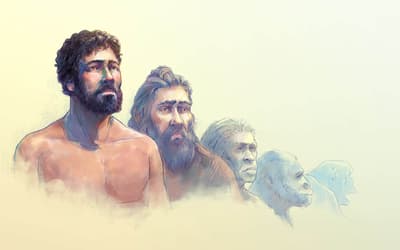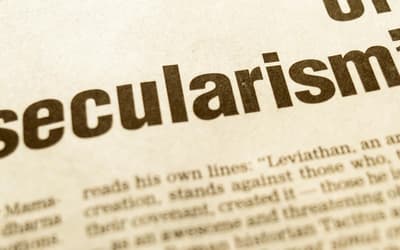The views expressed in this paper are those of the writer(s) and are not necessarily those of the ARJ Editor or Answers in Genesis.
Abstract
Literary theorist and prominent public intellectual Stanley Fish is a self-described “antifoundationalist”—someone who believes that truth is relative to one’s “interpretive community.” As such, he provides an as-your-own-poets-hath-said opportunity for Christian apologists. He is particularly helpful in puncturing the inflated claims of Enlightenment secularist liberalism, and along with it the scientism that underlies much public discourse in the West. Fish can be useful to theological conservatives, and creationists in particular. John Frame’s approach to presuppositional apologetics, and in particular his “triperspectivalism,” are helpful tools making possible a careful Christian appropriation of Fish’s work.
Keywords: Stanley Fish, John Frame, foundationalism, anti-foundationalism, apologetics, presuppositionalism, relativism, liberalism, situational perspective, perspectivalism, meaning, truth
Prelude
On my way to deliver the paper below at a conference of seminary professors, I sat next to a National Collegiate Athletic Association Division 1 tennis coach. I struck up a conversation with the intent to share the gospel with her—but another voice intruded. It was a friendly and voluble young lady sitting in front of me. She jumped so actively into the discussion that, fairly quickly, she and I were the only ones talking and the tennis coach turned back to her magazine. The young lady’s seatmate offered to switch places with me, and I spent the rest of the flight to Green Bay talking to a professing Christian who teaches high school science in a public school and holds a dual science degree from a prominent secular university.
The discussion turned to the creation-evolution debate, and she informed me that she arrived at college as an ardent young-earth, six-day creationist, only to be converted to theistic evolution when she was exposed to the evidence—she mentioned particularly the placement of trilobites in sedimentary strata.
I confessed that my knowledge of trilobites was rather low; I couldn’t dispute that particular evidence. I asked her instead how her Christian faith influenced her science. In particular, I said, “The Bible says that the Fall plunged the entire creation into bondage to corruption. So what role does the Fall play in your scientific work?”
“None,” she replied.
“Why not?”
“Because it can’t be proven.”
For the first and only time in the conversation, tension rose between seats 9A and 9B when I countered, “But who determines what counts as proof?”
She had no answer and changed the subject.
It was, in part, Stanley Fish who helped me think of that all-important question. And I am convinced that in his thought lie more resources for apologists for biblical, young-earth creationism.
To Fish We Now Turn
In The Last Battle, the final installment in C. S. Lewis’s Narnia series, protagonists Eustace, Jill, and Tirian are surprised and incensed to find that some of their supposed allies are not fighting on their side. But they’re not fighting for the other side either, the Calormene side. Stanley Fish, eminent literary critic, legal theorist, and antifoundationalist, is no dwarf—intellectually speaking. His skills in literary theory, legal analysis, and prose composition are evident. The bestselling writer of How to Write a Sentence, he makes Milton a contemporary conversation partner, cites Augustine with authority, and drops in biblical and cultural allusions with insight and deftness. And Fish uses these rhetorical powers to further a clear and unified mission, to hammer one message home again and again.1
But Fish is a pragmatist for the pragmatists. And many of his readers respond much as Eustace did to the dwarfs’ treachery:2 one of Fish’s two festschrifts (if you can call it that) is a book titled Postmodern Sophistry.3 Many of Fish’s opponents see in his antifoundationalism a perverse and bewildering threat.4 That may be because, unlike the dwarfs, Fish is not an equal opportunity archer. He shoots most often at his (putative) own kind, liberals.
For this reason Fish is politically useful to conservatives. He punctures the inflated claims of the reigning liberal elite. He shows again and again that no argument is neutral, that “tolerance” is a chimera, and that everyone has an agenda built on faith-based presuppositions. And he not only fires at Christians’ enemies; he can help us perceive incursions they have made into our own intellectual territory—Christians can sometimes be tempted to think like Enlightenment liberals too.
Fish is also one of those writers whose big idea amounts to a synthetic view of the world (though he disarmingly and strenuously denies it), a view that opens up new vistas. This is one of the reasons we praise great authors such as C. S. Lewis: mastering their work means providing yourself with an alternate set of lenses that regularly come in handy.5
My thesis in this article is simple: Fish can be useful to theological conservatives, and creationists in particular. Our rightful rejection of his reader-response criticism should not lead us to feel that we can safely ignore everything else he says. I hope simply that as a result of this paper, some readers will subscribe to Fish’s RSS feed (http://opinionator.blogs.nytimes.com/category/stanley-fish/), comment on his Times pieces, pick up one of his essay collections,6 and, ultimately, use Fish in Christian apologetic work.7 But to make safe use of Fish, conservatives need to understand how presuppositionalism is similar to and yet differs from his program. So, I will spend a little time linking Fish and Frame.8
We have in Fish a powerful ally in an unexpected quarter, as long as we can dodge his arrows ourselves.
Give a Man a Fish
Fish on literary theory: Is there a text in this class?
Before he became a public intellectual gadfly, Fish first achieved fame in literary circles. He is, of all things, a Milton scholar (Fish 1998). His distinctive philosophical views were, in fact, generated in large part from Milton’s “severe anti-formalism” (Fish 1994, p. 292). The antinomian Milton said (according to Fish) that the human actions that count as good are those that are actions of the Holy Spirit; a mere list of rules cannot suffice to demarcate the good because they cannot account for the inner voice of conscience.9
Fish’s best-known work, cited reliably whenever his name is ticked off on a list of major literary theorists, is the 1980 book Is There a Text in This Class? The Authority of Interpretive Communities. But Fish explains in a lengthy introduction that its essays come from a period of transition in his thought, so that by the end of the book he has a different view than the one that he began with. In one essay in particular (“Interpreting the Variorum” [of Milton]), Fish actually finishes by deconstructing the view he just propounded (the final section was added several years after the first part was completed).
I want to avoid digging deeply into Fish’s reader-response criticism because it is a complex subject upon which multiple evangelical luminaries have already expounded at great length (Carson 1996, pp. 114–15; Osborne 2006, pp. 478–482; Thiselston 1992, pp. 535–550; Vanhoozer 1998, p. 488). It is also, in my opinion, unnecessary to master Fish’s reader-response theory before finding his work outside literary criticism useful. Fish himself has pushed beyond literary theory; we may carefully do so as well.10 But I will attempt briefly to explain Fish’s basic thesis. He argues
that the form of the reader’s experience, formal units, and the structure of intention are one, that they come into view simultaneously, and that therefore the questions of priority and independence do not arise. (Fish 1980, p. 177)
In other words, neither reader nor text nor authorial intent (the three major “poles” of criticism) has priority over any of its fellows. Supposedly objective structures, such as genre and form in particular, do not have some sort of independent existence. They are there—they are “facts”—but only by virtue of the structures and rules put in place by one’s interpretive community (Fish 1980, p. 152).
The essay that records Fish’s change of mind starts with his disagreements with formalist criticism (a text- rather than author- or reader-centered approach).11 He felt that formalists were missing something more basic than their structures allowed for, something that happens prior to the operation of their brand of criticism. But, he writes,
what I did not then see is that the moment that disappears in a formalist analysis is the moment that has been made to appear in another kind of analysis, the kind of analysis I was urging. . . . The facts that I cite as ones ignored by a formalist criticism . . . are not discovered but created by the criticism I myself was practicing. (Fish 1980, p. 148)
Fish concludes his introduction by saying,
It was at this point that I elaborated the notion of interpretive communities as an explanation both for the difference we see—and, by seeing, make—and for the fact that those differences are not random or idiosyncratic but systematic and conventional. (Fish 1980, p. 148)
The “differences are not random”—and this is key. It means that not just any interpretation will fly. It has to be made to fly. You have to get other people to buy it in order for your interpretation to make any difference. And the only way that is likely to happen is if it is generated by assumptions already prevalent in a particular interpretive community. To give a common theological example, a paedobaptist is unlikely to persuade an ardent credobaptist that his reading of Jeremiah 31 is wrong; he would have to overturn a whole set of my assumptions—an entire complex model of the data—in order to do so.
Fish’s brand of antifoundationalism, though I disagree with it quite definitively, makes an empirical point I readily concede: that countless “foundations” (and resultant interpretive communities) do in fact exist.12
Fish on Relativism: What Is Truth?
The seminary student who reads a paragraph about Fish’s literary theory in his hermeneutics textbook may come away with the idea that Fish is a demolition man removing all authority from the biblical text (or any other). But Fish’s recognition of the importance of interpretive communities makes him not so much an explosives expert (please bear with the metaphor) as an umpire on the baseball field pointing out adroitly that one of the teams is actually playing cricket.13
If truth is in any sense “relative” for Fish, it is at least relative to something with some definiteness—to one’s interpretive community.14 But this does not necessarily translate into anything very radical in Fish’s literary criticism because the interpretive community of which he is a part is a fairly staid one. “You will never,” Fish writes, “hear in any of my classes the some-people-say-X-but-others-say-Y-and-who’s-to-judge dance. What I strive to determine, together with my students, is which of the competing accounts of a matter (an academic not a political matter) is the right one and which are wrong” (Fish 2008, p. 38).15
Authorial intent plays a prominent role in this pursuit. In a review of Antonin Scalia and Bryan A. Garner’s Reading Law: The Interpretation of Legal Texts (2012). Fish writes,
Living Constitutionalism is . . . a form of political gerrymandering rather than . . . a form of interpretation; for it regards the text not as an object of explication, but as an object of manipulation. (Let’s see if we can make it mean what we want it to mean.) (Fish 2012c)
Fish goes on to defend the importance of authorial intent, saying that as a reader you will of necessity discern some sort of purpose behind any significant work. You might not have psychological access to the author’s inner feelings, but you will at least see his work as part of a historical tradition or discussion.
Fish’s actual criticism of specific texts (whether literary or legal) simply does not yield the revisionist wackiness a cultural conservative might expect. His antifoundationalism is clearly not an excuse for sloppy academic work. He complains directly that
the logic of relativism . . . undermines the possibility of saying that some things are true and others false, or that some verbal expressions are beautiful and inspiring while others are ugly and potentially dangerous. Shakespeare or graffiti? Just different strokes for different folks. (Fish 1999, p. 25)
True and false, good and evil—Fish is happy to use such words, and he does so with the force of clear personal and moral conviction (see, for example, Fish 2008, pp. 18–19). So the “gotcha” we have all chuckled at will not work with him—“So there’s no absolute truth—are you absolutely sure?”16 He actually does believe that “transcendent values” exist.
But here’s the key point: even though transcendent values do exist for Fish, he simply does not believe we have the kind of access to them that others will find persuasive.17 To pull in presuppositionalism a bit prematurely, if you think of Van Til’s most famous diagram, Fish agrees that there is a big circle and a little circle; there just are no sticks connecting them.18
Fish’s comments to Marvin Olasky in a recent interview before King’s College students admirably summarize Fish’s views. Olasky asked Fish, “What is truth?” Fish replied,
I try to put together the traditional ambition to find the truth with the modern and postmodern realization that the truth can only be sought in imperfect and historical forms. I reject and resist the idea either that truth is relative to the position of the inquirer or that there is no truth to discover. On the other hand, the search for truth, which is a universal, can only take place within the resources available to us as partial, limited beings.19
Suppress the truth of God’s eternal power and divine nature (Romans 1:19), and what foundation are you left with? Most people, it seems, are content to ignore that question or cloud it, but Fish continually probes it. This is not what most people would expect from a straight-up relativist.
Fish on Liberalism: Why Can’t We All Just Get Along?
Fish’s views, generated originally from his literary theory, translate into a ready and unceasing critique of secular, Enlightenment, democratic liberalism. (Indeed, he titled one article “Liberalism Doesn’t Exist,” [Fish 1987, p. 997].) This is where Fish has made his biggest public splash and where he spends most of his public writing time. In multiple books and (since 2006) many dozens of The New York Times blog-columns,20 Fish manages to be entertaining and current while saying the same thing over and over.
Fish describes his own political proclivities this way: “I am what used to be known as a Skip Jackson-Bobby Kennedy democrat—fairly progressive on social issues, fairly conservative on economic issues, and decidedly conservative on foreign policy issues.”21 But his concern in his writing is not usually issues but foundations. He tends to use the latter to reach the former.
The trouble with principle
Perhaps the best single essay on liberalism in Fish’s huge oeuvre—“Why We Can’t All Just Get Along” (Fish 1996, pp. 18–26)—gets its title via a riff on Rodney King’s famous plea to the L.A. rioters in 1992. That essay appears in a collection of essays, a book called The Trouble with Principle. Fish explains his title flatly:
I am . . . against adherence to principle. The trouble with principle is, first, that it does not exist, and second, that nowadays many bad things are done in its name. (Fish 1999, p. 2)22
Fish’s book title is a tip-off to his argument against liberalism and ultimately to his explanation of why humanity can never seem to rise to Rodney King’s plea. Enlightenment liberalism, coming as it did out of a Europe bathed in sectarian bloodshed, thinks that by installing neutral, supracultural principles of fairness and equality, humans can live together in harmony. But Fish argues that there are no universal principles available to mankind that do not themselves carry “substantive commitments” (Fish 1999, p. 3).
Even if you could come up with a principle that was genuinely neutral—a notion of fairness unattached to any preferred goal or vision of life—it would be unhelpful because it would be empty (that, after all, is the requirement); invoking it would point you in no particular direction, would not tell you where to go or what to do. A real neutral principle, even if it were available, wouldn’t get you anywhere in particular because it would get you anywhere at all. (Fish 1999, p. 4)
A supposedly neutral principle such as “free speech”—
just like “fairness” and “merit”—rather than a concept that sits above the fray, monitoring its progress and keeping the combatants honest, . . . is right there in the middle of the fray, an object of contest that will enable those who capture it to parade their virtue at the easy expense of their opponents: we’re for fairness and you are for biased judgment; we’re for merit and you are for special interests; we’re for objectivity and you are playing politics; we’re for free speech and you are for censorship and ideological tyranny. (Fish 1994, p. 16)
Fish summarizes liberalism this way:
Liberal thought begins in the acknowledgment that faction, difference, and point of view are irreducible; but the liberal strategy is to devise (or attempt to devise) procedural mechanisms that are neutral with respect to point of view and therefore can serve to frame partisan debates in a nonpartisan manner. I put the matter this way so as to point up what seems to me an obvious contradiction: on the one hand, a strong acknowledgment of the unavailability of a transcendent perspective of the kind provided by traditional Christianity (against whose dogmas liberalism defines itself), and on the other, a faith . . . in the capacity of partial (in two senses) human intelligences to put aside their partialities and hew to a standard that transcends them. (Fish 1994, p. 16)
Fish offers as an example the infamous Supreme Court case Plessy v. Ferguson (1896). The plaintiff argued that a Louisiana law requiring separate-but-equal train accommodations for blacks and whites violated the Constitution, particularly the fourteenth amendment.23 The court ruled in favor of segregation, saying that it was improper for the plaintiffs to assume “that the enforced separation of the two races stamps the colored race with a badge of inferiority.” If this is so, the court said, “it is not by reason of anything found in the act but solely because the colored race chooses to put that construction on it” (Plessy v. Ferguson, 163 U.S. 537 [1896]). In other words, the specific text of the law (pay no attention to those authorial intentions behind the curtain) never says that blacks are inferior. And if blacks are being treated the same as whites—via a neutral principle—then blacks have no room to complain.
It sounds evenhanded to say “We treat each race equally.” But everyone knows that that supposedly neutral principle, when placed in a historical context, yielded anything but fairness. Everybody knew that the true purpose of the supposedly neutral law was to keep blacks out of the cars whites traveled in.24
Principles, Fish argues, are only tools used by various tribes to advance their respective agendas. Secular liberalism has won the cultural high ground in the United States, so its principles are in the ascendancy. But they are anything but neutral.
Liberalism and religion
American liberals are past the days of (overt) racism. But they are open in their disdain for religion. This attitude is one of Fish’s favorite targets. On this topic he is extremely incisive:
If you persuade liberalism that its dismissive marginalizing of religious discourse is a violation of its own chief principle, all you will gain is the right to sit down at liberalism’s table where before you were denied an invitation; but it will still be liberalism’s table that you are sitting at, and the etiquette of the conversation will still be hers. That is, someone will now turn and ask, “Well, what does religion have to say about this question?” And when, as often will be the case, religion’s answer is doctrinaire (what else could it be?), the moderator (a title deeply revealing) will nod politely and turn to someone who is presumed to be more reasonable. (Fish 1999, p. 250)
The sheer amount of verbiage Fish dedicates to such arguments is a testimony to his assiduous and unified mission to expose the emperor’s nakedness:
Liberalism very much wants to believe that it is being fair to religion, but what it calls fairness amounts to cutting religion down to liberal size. . . . The conflict between the liberal state, with its devotion to procedural rather than substantive norms, and religion, which is all substance from its doctrines to its procedures, is intractable. (Fish 2010c)
Secular reason can’t do its own self-assigned job—of describing the world in ways that allow us to move forward in our projects—without importing, but not acknowledging, the very perspectives it pushes away in disdain.25
A political structure that welcomes all worldviews into the marketplace of ideas, but holds itself aloof from any and all of them, will have no basis for judging the outcomes its procedures yield. Worldviews bring with them substantive long-term goals that serve as a check against local desires. Worldviews furnish those who live within them with reasons that are more than merely prudential or strategic for acting in one way rather than another. (Fish 2010b)
These insights hardly need comment. I only wish to encourage Christian thinkers to go ahead and use them despite—and because of—their source.
Presuppositionalism à la John Frame
Fish’s presuppositionalism
Fish hands us many apologetic opportunities, and he does so with far greater eloquence than most of us could muster. But with an intellectual archer so clear-sighted, one liable to fire at us too, Christians must be careful how they use Fish. John Frame’s presuppositionalism—and particularly his triperspectivalism—is, I think, the tool we need to do this.
Fish himself points strongly toward presuppositionalism. When Marvin Olasky asked Fish, “Can truth be both objective and subjective at the same time?” Fish answered,
I believe that truth is objective. . . —as someone who believes in interpreting the Constitution or the statute as the product of the intention of the framers . . . —I believe that this is absolutely the case. And I also believe that anyone who thinks anything else about interpretation is absolutely wrong. But I also believe that there is no necessarily successful mechanism by which I can persuade others who hold the wrong view but are as educated and credentialed as I am. This is what C. S. Peirce, the great American philosopher, called “the tenacity of belief.” At a certain point, your effort to persuade the other or [his effort to persuade] you runs out, because you’ve reached that bedrock level of belief beyond which argument will not help. So, yes objective truth. But no, there’s no absolutely successful algorithm available for demonstrating it to people who aren’t you. (Fish 2011b)
There is a “bedrock level” in each human being—not of evidence, not of reason, not of instinct, but of belief. This is obviously the language of presuppositionalism.26 Likewise, Fish writes in his Times blog-column,
there is no such thing as “common observation” or simply reporting the facts. To be sure, there is observation and observation can indeed serve to support or challenge hypotheses. But the act of observing can itself only take place within hypotheses (about the way the world is) that cannot be observation’s objects because it is within them that observation and reasoning occur. (Fish 2009b)
This thinking provides the means for Fish to attack yet another supposedly neutral principle—academic freedom:
Academic freedom is not a defense against orthodoxy; it is an orthodoxy and a faith. . . . Academic freedom urges the interrogation of all propositions and the privileging of none, the equal rights of all voices to be heard, no matter how radical or unsettling, and the obligation to subject even one’s most cherished convictions to the scrutiny of reason. What academic freedom excludes is any position that refuses that obligation, any position which rests, for example, on pronouncements like “I am the way” or “Thou shalt have no other gods before me.” Fish 1999, p. 4027
Fish is transcendently right. At the foundation of all interpretive communities—and of all individuals—lie beliefs which determine their reading of the evidence, beliefs that determine even what counts as evidence! Fish takes these essentially presuppositional insights and applies them all over the culture.
Fish and Frame
It makes sense that one of Christian theology’s foremost epistemologists—John Frame—would provide the necessary framework through which Fish’s provocative public pronouncements can be made useful to Christians. Fish shows the value and power of what Frame calls the “situational perspective.” Ethics, according to Frame, includes three perspectives, matching the three elements involved in every moral decision: (1) a person (2) applying a norm to (3) a situation. The normative, situational, and existential (that is, personal) perspectives are ways of reflecting on ethics—and nearly everything else.28
The situational perspective
Fish is, like the writer of Ecclesiastes at times, an example of what it looks like to live without access to the normative perspective. All he has is the situational (one’s historically defined interpretive community) and the existential (one’s beliefs and desires). Seen in this way, what Frame can bring to Fish’s perspective is quite simple. Fish’s particular brand of relativism—his antifoundationalism—just needs transcendent footers. Fish needs access to universal norms; he needs a foundation no man can lay.
Without one, he ends up having to say things such as, “Ends-based reasoning cannot be avoided” (Fish 1999, p. 8). Even if transcendent norms exist, as Fish has admitted, our imperfect access to them means we will just have to muddle through as persuasively as we can.
Frame’s careful discussion of the various ways God reveals truth to man is therefore apropos. His latest volume in the Theology of Lordship series, The Doctrine of the Word of God, distinguishes carefully among God’s revelation through events, personal examples, accredited prophetic voices, and God’s direct divine communication (see the chapter titles in Part Four: How the Word Comes to Us [Frame 2010, pp. ix–x]). General revelation is also a huge emphasis in Frame’s theology. All humans do have access to God’s truth, according to Romans 1 and 2. It is, in the final analysis, written on every human heart (though we cannot know that without the Bible).29 The Fall has twisted our interpretations of the facts and led us to suppress them, but the God who invented language can cut through rebellious interpretive communities with His piercing-to-the-division-of-soul-and-spirit Word.30
Ethical knowledge
Frame provides another important insight into Fish. At the center of Frame’s epistemological project lies the conviction that all knowledge is “ethical knowledge” (Frame 1987, pp. 108–109).31 That is, every thought must be taken captive to God’s will and aimed at His glory. Knowing, along with doing and feeling and every other human activity, must be done in obedience to God. Knowledge is ethical.
This perspective turns Fish’s (at first shocking) disavowal of principle into yet another arrow flying at the Calormenes. Presuppositionalists should, along with Fish, be happy to recognize that there are no neutral principles. Every principle has substance and direction. Every principle is either with God or against Him. Principles either begin with the fear of the Lord, or they are not true knowledge (Proverbs 1:7).
This does not mean that all Christian principles are universals. There are, of course, non-universal principles in Scripture. I think primarily of (many of) the Proverbs. They provide a kind of case law requiring us to be attuned to our situation. Will answering this fool humble him or will it just embarrass me? (Proverbs 26:4–5).32 But the moral laws of the universe flow from God’s person, so universal principles do exist and can be used/applied transhistorically and transculturally.
Fish says, “Neutral principles, if they are to deserve the name, must be presented as if they came first, as if they were there before history” (Fish 1999, p. 6). And it is the duty of the Christian to say that they were—because God in His creative wisdom can ensure that obedience to His universal principles leads to the only true vision of the good, God Himself.33 This is again to admit Fish’s point, that there are no neutral principles. Christian principles are filled with substantive content, a definite agenda: glorifying God and enjoying Him forever.
Meaning is use
Another link between Fish and Frame comes in their mutual agreement that meaning is use. They do not mean exactly the same thing by this phrase; Frame says that someone who cannot use the Bible does not really understand it (Frame 1987, pp. 82–85),34 while Fish says that the only meaning that counts is the use any given reader/community puts a text to. I said I would not dig deeply into this issue, so I will only suggest here that this connection needs further research.35
The heart of the matter
A last way that Frame can help us make use of Fish derives from the way Frame sees the human person as a unified being, not a collection of independent faculties (mind, will, and emotion) vying for supremacy. Frame points out that believing, feeling, thinking, and acting are not finally separable. To know something is, from another perspective, to have a certain kind of feeling about it—a feeling Frame calls “cognitive rest” (Frame 1987, pp. 152–153). To know something means, in part, that other thoughts are not troubling you about your knowledge—making you feel unsettled about it.
The inseparability of thoughts and feelings is one reason why mind and heart can be used interchangeably in Scripture (and, incidentally, in contemporary English). People’s beliefs have an overall direction provided by something even more fundamental than their beliefs but still tightly linked to them—their loves. The Bible places love at the center of Christian duty (Deuteronomy 6:4–5; Matthew 22:34–41), and it is the heart-change bound up in the New Covenant that finally solves the problems that led Old Testament Israel into repeated failure. Presuppositionalism points to heart allegiance as the most fundamental truth about a person.
So Fish has to be at his most presuppositional when he writes,
Sometimes the principled reasons people give for taking a position are just window dressing, good for public display but only incidental to the heart of the matter, which is the state of their hearts. (Fish 1999, p. 33)36
Using Fish
Most evangelical scholars I am aware of who make any use of Fish do so in surveys of literary theory.37 They are perfectly right to criticize his views of Bible interpretation, because a literary theorist who thinks we have no reliable access to transcendent truth will of necessity get Bible interpretation wrong. For Fish, the Bible, besides being a resonant source of allusions, is just another text over which interpretive communities fight. One denomination or theological viewpoint gains ascendancy for a time, then another—as in Thomas Kuhn’s The Structure of Scientific Revolutions—overturns it.
Some evangelical scholars, however, grant some validity to Fish’s literary-theoretical insights.38 Grant Osborne summarizes Fish: “Most of us are reader-response critics of a type” (Osborne 2006, p. 479). It is common, he points out, for evangelical Bible teachers to instruct their students to try to put themselves in the sandals of the Bible’s original audiences. Osborne also sees value in noting the importance of interpretive communities even within evangelicalism: “My understanding of the book of Revelation will be very different if I belong to a dispensational or a Reformed community.” Osborne is willing to say, “Much can be commended in reader-response criticism” (Osborne 2006, p. 480).
But Fish’s literary theory is not the focus of this article—how can the rest of his thought and writings be used by conservative Christians?
Most of Fish’s quotations cited in this discussion probably speak for themselves. Learning to spot the secularist liberal emperor’s clotheslessness is a useful skill. And Fish offers us the power to say to Yalies in the New Haven Areopagus, “As one of your own literary theorists has said . . .” (Acts 17:22–31).
Public persuasion
Too many Christians have agreed with the regnant bullies that religious evidence has been ruled inadmissible in the public square. So when Christians go on TV and talk about the horizontal sociological effects of homosexuality or teen pregnancy, they (all too often) fail to mention the vertical—“Against you, you only, have I sinned.” Granted, in the world God made, horizontal effects are part of God’s general revelation; they show us that sin does not work in the world God created. But no one can repent of his sins and trust creation. Christians are the only people who have a good answer for why the negative sociological effects of sin are in fact negative. We have a transcendent foundation for evaluating the issues of the day.
When I bought The Trouble with Principle—and began to dig deeper into Fish—it was because an Amazon commenter had said the book criticizes creationism for twisting Fish’s antifoundationalism into an argument for a young earth (exactly what I am doing in this article). Fish’s criticism of creationism, as it turns out, was not developed beyond a single paragraph (Fish 1999, pp. 288–289). But Fish did target several well-known Christians. Notably, George Marsden came under criticism for selling out his convictions:
[Marsden writes] with a dispassionate equanimity that sits oddly with the strong point of view he announces in his introduction. “My point of view,” he declares, “is that of a fairly traditional Protestant of the reformed theological heritage. One of the features of that heritage is that it has valued education that relates faith to one’s scholarship. Particularly important is that beliefs about God, God’s creation, and God’s will . . . should have impact on scholarship not just in theology, but also in considering other dimensions of human thought and relationships.” But in the long narrative that follows, these beliefs become objects of study rather than informing principles of the scholarship. It is as if Marsden had discharged his obligation to his “point of view” simply by announcing it, and can now proceed on his way without being unduly influenced by its values. “It is perfectly possible,” he asserts, “to have strong evaluative interests in a subject, and yet treat it fairly and with a degree of detachment.”
But it is possible to detach yourself from a “strong evaluative interest” only if you believe in a stage of perception that exists before interest kicks in; and not only is that a prime tenet of liberal thought, it is what makes possible the exclusionary move of which Marsden . . . complain[s]. If such a base-level stage of perception does in fact exist, it can be identified as the common ground in relation to which uncommon—that is, not universally shared-convictions (like, for example, Christ is risen) can be marginalized and privatized. By claiming to have set aside his strongly held values in deference to the virtue of fairness—a virtue only if you are committed to the priority of procedure over substance—Marsden agrees to play by the rules of the very ideology of which his book is in large part a critique. (Fish 1999, pp. 259–260)
Fish will not let Christians get away with merely horizontal arguments.39 If he is right, then Christians in the public square have a duty to do a little deconstruction and then give reasons for their positions that are based on divine revelation. I think Fish gives us not just an excuse but marching orders for bringing the Bible into the public square:
To put the matter baldly, a person of religious conviction should not want to enter the marketplace of ideas but to shut it down, at least insofar as it presumes to determine matters that he believes have been determined by God and faith. The religious person should not seek an accommodation with liberalism; he should seek to rout it from the field, to extirpate it, root and branch. . . . A religion deprived of the opportunity to transform the culture in its every detail is hardly a religion at all. (Fish 1999, pp. 250–251)40
Science and faith
As an apologist C. S. Lewis may or may not persuade his readers to become Christians, but he does buttress the faith of many believers who come to him with only weak answers to apologetic questions. Fish can provide a similar benefit when it comes to the relationship of faith and reason or religion and science.
Fish can actually sound a great deal like Lewis, who pointed out in Mere Christianity that everyone takes most of what he knows on authority.41 Take, as just one of many examples, Fish’s comments on an episode of Up w/Chris Hayes (MSNBC) featuring panelists Richard Dawkins, Steven Pinker, and Susan Jacoby—two evolutionary scientists and a secularist, respectively. “It was no surprise,” comments Fish,
that the panel’s default position, stated almost explicitly by Susan Jacoby, was that religion clouds the mind of those who, if they were only sufficiently educated, would arrive at the conclusion supported by the overwhelming preponderance of scientific evidence and reject the blind adherence to revealed or ecclesiastical authority that characterizes religious belief. (Fish 2012a)
But host Chris Hayes, a card-carrying liberal, actually pushed back against (what Fish calls) the “self-congratulatory unanimity” of his panelists. As Fish tells it, Hayes asked,
If you hold to the general skepticism that informs scientific inquiry—that is, if you refuse either to anoint a viewpoint in advance because it is widely held or to send viewpoints away because they are regarded as fanciful or preposterous—how do you respond to global-warming deniers or Holocaust deniers or creationists when they invoke the same principle of open inquiry to argue that they should be given a fair hearing and be represented in departments of history, biology, and environmental science? What do you do . . . when, in an act of jujitsu, the enemies of liberal, scientific skepticism wield it as a weapon against its adherents? (Fish 2012a)
Hayes’s panelists reacted predictably, and I’ll let Fish tell the rest of the tale:
Dawkins and Pinker replied that you ask them to show you their evidence—the basis of their claim to be taken seriously—and then you show them yours, and you contrast the precious few facts they have with the enormous body of data collected and vetted by credentialed scholars and published in the discipline’s leading journals. Point, game, match.
Not quite. Pushed by Hayes, who had observed that when we accept the conclusions of scientific investigation we necessarily do so on trust (how many of us have done or could replicate the experiments?) and are thus not so different from religious believers, Dawkins and Pinker asserted that the trust we place in scientific researchers, as opposed to religious pronouncements, has been earned by their record of achievement and by the public rigor of their procedures. In short, our trust is justified, theirs is blind.
It was at this point that Dawkins said something amazing, although neither he nor anyone else picked up on it. He said: in the arena of science you can invoke Professor So-and-So’s study published in 2008, “you can actually cite chapter and verse.”
With this proverbial phrase, Dawkins unwittingly (I assume) attached himself to the centuries-old practice of citing biblical verses in support of a position on any number of matters, including, but not limited to, diet, animal husbandry, agricultural policy, family governance, political governance, commercial activities and the conduct of war. Intellectual responsibility for such matters has passed in the modern era from the Bible to academic departments bearing the names of my enumerated topics. We still cite chapter and verse—we still operate on trust—but the scripture has changed (at least in this country) and is now identified with the most up-to-date research conducted by credentialed and secular investigators. The question is, what makes one chapter and verse more authoritative for citing than the other? The question did not arise in the discussion, but had it arisen, Dawkins and Pinker would no doubt have responded by extending the point they had already made: The chapter and verse of scriptural citation is based on nothing but subjective faith; the chapter and verse of scientific citation is based on facts and evidence.
The argument is circular and amounts to saying that the chapter and verse we find authoritative is the chapter and verse of the scripture we believe in because we believe in its first principle, in this case the adequacy and superiority of a materialist inquiry into questions religion answers by mere dogma. To be sure, those who stand with Dawkins and Pinker could also add that they believe in the chapter and verse of scientific inquiry for good reasons, and that would be true. But the reasons undergirding that belief are not independent of it. (Fish 2012a)
Fish’s New York Times readers also reacted predictably—mostly by repeating in various ways what Dawkins and Pinker had asserted (or by simple name-calling). They were especially incensed by one particular heresy Fish had supposedly advanced, that religion and science are equivalent. Fish relishes quoting from and interacting with his commenters:
Michael K. declares that “the equivalence between the methodological premises of scientific inquiry and those of religious doctrine is simply false.” I agree, but I do not assert it. Neither do I assert that because there are no “impersonal standards and impartial procedures . . . all standards and procedures are equivalent”. . . . What I do assert is that with respect to a single demand—the demand that the methodological procedures of an enterprise be tethered to the world of fact in a manner unmediated by assumptions—science and religion are in the same condition of not being able to meet it (as are history, anthropology, political science, sociology, psychology and all the rest). (Fish 2012b)
Fish goes on to complain that many of his readers “characterize the scientific method as one that features independently available evidence as the neutral arbiter of disputes.” He simply replies that “evidence is never independent and is only evidence within the precincts of a particular theory” (Fish 2012b).
As Fish says in another Times post, “The epistemological critique of religion—it is an inferior way of knowing—is the flip side of a naïve and untenable positivism” (Fish 2009b).
It seems most appropriate to end this section with a biblical quotation—from a passage that Fish actually points to as a fountainhead of all his thought:
If there is no thought without constraints (chains) and if the constraints cannot be the object of thought because they mark out the space in which thought will go on, what is noticed and perspicuous will always be a function of what cannot be noticed because it cannot be seen. The theological formulation of this insight is well known: Faith is the substance of things hoped for, the evidence of things not seen (Hebrews 11). Once the act of simply reporting or simply observing is exposed as a fiction—as something that just can’t be done—the facile opposition between faith-thinking and thinking grounded in independent evidence cannot be maintained. (Fish 2009b)
Fish and Ultimate Issues
Fish seems to thrive on objections. His answers never seem hot under the collar, and he always, always has answers—he writes as if he has never heard a new objection. After making his usual points against liberalism, he wrote recently in The New York Times:
I know the objections to what I have said here. It amounts to an apology for identity politics. It elevates tribal obligations over the universal obligations we owe to each other as citizens. It licenses differential and discriminatory treatment on the basis of contested points of view. It substitutes for the rule “don’t do it to them if you don’t want it done to you” the rule “be sure to do it to them first and more effectively.” It implies finally that might makes right. I can live with that. (Fish 2012d, emphasis mine)42
That last line features Fish at his most candid. An antifoundationalist, pragmatist world—at best—has only a mute God vainly trying to communicate with us; so other mights will have to step in and make right. The biggest mights we have going are the more powerful tribes of the world. What honest alternative is there? Fish, in my opinion, demolishes the secularist liberal paradigm.
This, however, brings up a criticism I have of Fish. He knows Christianity well enough that he ought to reject the pessimism his vision brings and seek the hope of the gospel. Carl Trueman is right to point out that while the death of our cultural metanarrative (due in part to thinkers like Fish) might seem to free people who used to be oppressed (women, blacks, etc.), it also strips them of the opportunity to mount their own metanarratival challenge (Trueman 2003, pp. 317–318). In a world with no access to God’s mind, might will make right, and minorities will just get oppressed again. I cannot live with that.
Fish’s vision does not offer much hope:
The main thing I believe is that conflict is manageable only in the short run and that structures of conciliation and harmony are forever fragile and must always be shored up, with uncertain success I am tempted to turn this into an imperative—perhaps . . . ‘always politicize’—but the imperative would be unnecessary, for that is what we do all the time, whether we choose to or not. (Fish 1999, p. 15)
A reviewer in the online magazine Slate accurately read Fish to be saying that the foundation of liberalism standeth unsure—on nothing. The author of the review was appalled that, “maddeningly, [Fish] leads us to the center of the . . . maze, then refuses to extricate us.” The best the reviewer could do in the end was to call Fish names, namely “fatalist” (Culturebox 1999).
He was right. And herein lies perhaps the best apologetic opportunity Fish gives to theologically conservative Christians. Fish can do the work of a Francis Schaeffer, deconstructing an unregenerated person’s worldview and leaving him desperate for extrication from life’s maze. A little healthy deconstruction may strip away someone’s blind adherence to a dogma he is (dogmatically) sure is not a dogma. Fish may prime him to see that the fear of the Lord is the beginning of knowledge.
Fish’s aim is yet again accurate when he takes on liberalism’s failure to invest human life with meaning. Fish relates a story philosopher Jürgen Habermas tells about his own life. Habermas had a Swiss friend who, though never a religious believer during his life, elected to have a church funeral. Habermas says his friend
had sensed the awkwardness of non-religious burial practices and, by his choice of place, publicly declared that the enlightened modern age has failed to find a suitable replacement for a religious way of coping with the final rite de passage. (Fish 2010b)
Fish sharpens Habermas’s point:
in the context of full-bodied secularism, there would seem to be nothing to pass on to, and therefore no reason for anything like a funeral. (Fish 2010b)
But Fish himself can do no better. Although he knows the Bible fairly well, he has yet to recognize that all the foundations of all the interpretive communities in the world must beg, borrow, and steal from the biblical foundation to have morality, a telos, or other things that all worldviews require. Fish has not seen (or will not admit) that every one of the masons who constructed those foundations did his work with at least some—albeit suppressed and twisted—stones of Christian truth. The work of the law was written on their hearts (Romans 2:14–15).
You cannot live in a deconstructed world. Deconstruction is important, but eventually you have to go through the difficult work of reconstruction. By God’s grace Christians can do that work on the only foundation that will last when the rain descends and the floods come.
But Fish refuses. And when Marvin Olasky asked Fish, “Could you briefly describe your own faith?” he replied, “No, I could not.” (Olasky 2011)
Aslan’s Country
Lewis lets Narnia’s dwarfs into Aslan’s country in the end, but they have to stay in the vestibule, blinded and deadened to the feast around them. Stanley Fish is, likewise, close to the kingdom in many ways. He sees through the reigning paradigm of his day and cuts it down incisively. He also knows the gospel. Who can beat the eloquence of this (partial) gospel presentation?
in another popular Christian discourse, there is no way out of debt, and bankruptcy is the condition we are in from the moment of birth. This is a Calvinist discourse in which the language of money is allegorized. The debt we owe is owed to the God who made us in his image, an image defiled and corrupted by Adam and Eve, whose heirs in sin we all are. We may think that this unhappy inheritance could be overlain and covered by a succession of good deeds, but every deed we perform is infected by the base motives from which we cannot move one inch away. Every piece of currency we offer in payment of debt only increases it. The situation seems hopeless. (Fish 2009a)
Fish knows a good deal of Christian theology—not least by being an expert on Paradise Lost. But the Bible does not set up a Limbo for academics who skewer secularism as Lewis does for the dwarfs who shoot Calormenes.
The saddest thing I read while preparing this article comes from Fish’s book How to Write a Sentence. The last example of good sentence-writing he chooses to analyze comes from none other than Pilgrim’s Progress.
Although I have read and taught this sentence hundreds of times, it never fails to knock my socks off. Bunyan’s hero, Christian, has become aware that there is a burden (original sin) on his back and he will do anything to rid himself of it. He is told that he must fly from the “wrath to come”—that is, from eternal damnation—and in response he begins to run: Now he had not run far from his own door, but his wife and children perceiving it, began crying after him to return, but the man put his fingers in his ears, and ran on, crying, “Life! Life! eternal life.” (Fish 2011a, p. 156)
All I can do is pray that by God’s grace Fish would use that sentence according to the intention of its author.
Nomenclature
- Antifoundationalism (or Pragmatism, or Anti-essentialism)
- The view that humanity has no access to any transcendent foundation for truth.
- Presuppositionalism
- “A school of Christian apologetics that believes the Christian faith is the only basis for rational thought. It presupposes that the Bible is divine revelation and attempts to expose flaws in other worldviews. It claims that apart from presuppositions, one could not make sense of any human experience, and there can be no set of neutral assumptions from which to reason with a non-Christian.” (Wikipedia, “Presuppositional Apologetics”)
- Triperspectivalism
- A heuristic tool developed by Presbyterian theologian John Frame (and further elaborated by Vern Poythress) which notes that in all ethical questions there inhere three “perspectives”: a person (the existential perspective) applying a norm (the normative perspective) to a situation (the situational perspective).
References
Bartholomew, C. 2002. A God for life and not just Christmas. In The trustworthiness of God: Perspectives on the nature of scripture, ed. P. Helm and C. Trueman. Grand Rapids, Michigan: Eerdmans.
Bauerlein, M. 2011. A solitary thinker. The Chronicle of Higher Education 57, no. 37. Retrieved from http://chronicle.com/article/A-Solitary-Thinker/127464/.
Carson, D. A. 1996. The gagging of God: Christianity confronts pluralism. Grand Rapids, Michigan: Zondervan.
Collins, B. 2011. Scripture, hermeneutics, and theology: Evaluating theological interpretation of scripture. PhD diss., Bob Jones University.
Culturebox. 1999. The indefensible Stanley Fish. Slate. Retrieved from http://www.slate.com/articles/news_and_politics/culturebox/1999/12/the_indefensible_stanley_fish.single.html.
Fish, S. 1980. Is there a text in this class? The authority of interpretive communities. Cambridge, Massachusetts: Harvard University Press.
Fish, S. 1987. Liberalism doesn’t exist. Duke Law Journal 1987, no. 6:997–1001.
Fish, S. 1994. There’s no such thing as free speech, and it’s a good thing, too. New York, New York: Oxford University Press.
Fish, S. 1996. Why we can’t all just get along. First Things 8:18–26. Retrieved from http://www.firstthings.com/article/2007/09/001-why-we-cant-all-just-get-along-40.
Fish, S. 1998. Surprised by sin: The reader in Paradise Lost. 2nd ed. Cambridge, Massachusetts: Harvard University Press.
Fish, S. 1999. The trouble with principle. Cambridge, Massachusetts: Harvard University Press.
Fish S. 2004. One more time. In Postmodern sophistry: Stanley Fish and the critical enterprise, ed. G. A. Olson and L. Worsham. Albany, New York: State University of New York Press.
Fish, S. 2008. Save the world on your own time. New York, New York: Oxford University Press.
Fish, S. 2009a. Faith and deficits. The New York Times, March 1, 2009. Retrieved from http://opinionator.blogs.nytimes.com/2009/03/01/faith-and-deficits/.
Fish, S. 2009b. God talk, part 2. The New York Times, May 17, 2009. Retrieved from http://opinionator.blogs.nytimes.com/2009/05/17/god-talk-part-2/.
Fish, S. 2010a. Are there secular reasons? The New York Times, February 22, 2010. Retrieved from http://opinionator.blogs.nytimes.com/2010/02/22/are-there-secular-reasons/.
Fish, S. 2010b. Does reason know what it is missing? The New York Times, April 12, 2010. Retrieved from http://opinionator.blogs.nytimes.com/2010/04/12/does-reason-know-what-it-is-missing/.
Fish, S. 2010c. Is religion special? The New York Times, July 26, 2010. Retrieved from http://opinionator.blogs.nytimes.com/2010/07/26/is-religion-special/.
Fish, S. 2011a. How to write a sentence: And how to read one. New York, New York: HarperCollins.
Fish, S. 2011b. Interview by Marvin Olasky, January 18, 2011 at King’s College. Retrieved from http://www.tkc.edu/media/audio.
Fish, S. 2012a Citing chapter and verse: Which Scripture is the right one? The New York Times, March 26, 2012. Retrieved from http://opinionator.blogs.nytimes.com/2012/03/26/citing-chapter-and-verse-which-scripture-is-the-right-one/.
Fish, S. 2012b. Evidence in science and religion, part two. The New York Times, April 9, 2012. Retrieved from http://opinionator.blogs.nytimes.com/2012/04/09/evidence-in-science-and-religion-part-two/.
Fish, S. 2012c. Intention and the canons of legal interpretation. The New York Times, July 16, 2012. Retrieved from http://opinionator.blogs.nytimes.com/2012/07/16/intention-and-the-canons-of-legal-interpretation/.
Fish, S. 2012d. Two cheers for double standards. The New York Times, March 12, 2012. Retrieved from http://campaignstops.blogs.nytimes.com/2012/03/12/two-cheers-for-double-standards/.
Frame, J. M. 1987. The doctrine of the knowledge of God. Phillipsburg, New Jersey: Presbyterian & Reformed.
Frame, J. M. 1995. Cornelius Van Til: An analysis of his thought. Phillipsburg, New Jersey: Presbyterian & Reformed.
Frame, J. M. 2008a. The doctrine of the Christian life. Phillipsburg, New Jersey: Presbyterian & Reformed.
Frame, J. M. 2008b. A primer on perspectivalism. Frame & Poythress. Retrieved from http://www.frame-poythress.org/frame_articles/2008Primer.htm.
Frame, J. M. 2010. The doctrine of the Word of God. Phillipsburg, New Jersey: Presbyterian & Reformed.
Gracia, J. 2005. Meaning. In Dictionary for theological interpretation of the Bible, ed. K. J. Vanhoozer, pp. 492–499. Grand Rapids, Michigan: Baker.
Lewis, C. S. and P. Baynes. 2000. The last battle. New York, New York: HarperTrophy. (Orig. pub. 1956.)
Lewis, C. S. 2001. Mere Christianity. San Francisco, California: HarperSanFrancisco. (Orig. pub. 1952.)
Lieb M. and A. C. Labriola, eds. 2006. Milton in the age of Fish: Essays on authorship, text, and terrorism. Pittsburgh, Pennsylvania: Duquesne University Press.
Nussbuam, M. 1985. Sophistry about conventions. New Literary History 17, no. 1:129–139.
Olasky, M. 2011. Mystery + objectivity. World 26, no. 10. Retrieved from http://www.worldmag.com/2011/05/mystery_objectivity.
Olson, G. A. and L. Worsham. 2004. Rhetoric, emotion, and the justification of belief. In Postmodern sophistry: Stanley Fish and the critical enterprise, ed. G. A. Olson and L. Worsham. Albany, New York: State University of New York Press.
Osborne, G. R. 2006. The hermeneutical spiral: A comprehensive introduction to biblical interpretation. Downers Grove, Illinois: IVP Academic.
Paglia, C. 1991. Crisis in the American universities. Talk presented at Massachusetts Institute of Technology, Cambridge, Massachusetts, September 19, 1991. Retrieved from http://gos.sbc.edu/p/paglia.html.
Poythress, V. S. 2009. In the beginning was the Word: Language—a God-centered approach. Wheaton, Illinois: Crossway.
Rorty, R. 1999. Philosophy and social hope. London, England: Penguin.
Sandel M. 2010. Justice: What’s the right thing to do? New York, New York: Farrar, Straus and Giroux.
Scalia A. and B. A. Garner. 2012. Reading law: The interpretation of legal texts. St. Paul, Minnesota: Thomson/West.
Smith, S. D. 2010. The disenchantment of secular discourse. Cambridge, Massachusetts: Harvard University Press.
Thiselston, A. C. 1992. New horizons in hermeneutics: The theory and practice of transforming biblical reading. Grand Rapids, Michigan: Zondervan.
Thompson, M. D. 2006. A clear and present word: The clarity of Scripture. Downers Grove, Illinois: IVP Academic.
Trueman, C. 2003. It ain’t necessarily so. Westminster Theological Journal 65, no. 2:311–25.
Vanhoozer, K. 1998. Is there a meaning in this text? The Bible, the reader, and the morality of literary knowledge. Grand Rapids, Michigan: Zondervan.
Ward. M. n.d. Mark Ward’s Answer to ‘Why Do Some People Think “It’s in the Bible” Is a Valid Argument? Retrieved from http://www.quora.com/Mark-Ward-11/answers/The-Bible











